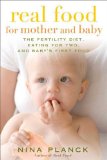Infertility and Polycystic Ovarian Syndrome
I recently spoke with a friend who told me her doctor gave her a PCOS or Polycystic Ovarian Syndrome diagnosis, so this excerpt caught my eye. I hope it is helpful to someone out there who longs for a positive pregnancy test… (I know how that feels.)
The following is another excerpt from Nina Planck in her new book: “Real Food for Mother and Baby: The Fertility Diet, Eating for Two, and Baby's First Foods“.
When you eat refined carbohydrates instead of fat, protein, and whole grains, cells are overexposed to sugar and to insulin, which spikes when you eat sugar. The cells become “insulin resistant,” or deaf to insulin. The usual result is weight gain. Insulin resistance also raises testosterone, which interferes with egg production; promotes insulin-like growth factors, which inhibit FSH; and causes the pituitary gland to make too much LH. All these symptoms plague women with polycystic ovary syndrome (PCOS), the most common cause of ovulatory infertility. Women with PCOS have irregular or absent periods, excess facial and body hair, and enlarged ovaries with small cysts. The cysts are immature eggs; they never mature and leave the ovary.
To treat infertility caused by PCOS, you must first tackle insulin resistance. Don't eat sugar, white flour, or white rice. When you snack, try chicken, nuts, celery, or fruit. Eat whole grains, and every time you eat any carbohydrate, have some fat or protein, such as butter or cheese, too. Losing 5-10% of your weight can also help you get pregnant. If you don't have PCOS, but you're overweight, the same advice applies. Eat whole foods and lose a little weight. High blood sugar and insulin resistance – even without a full-blown case of PCOS – also impair fertility.
- Read more about healthy dieting
- More about infertility and my own story




Leave a Reply